What I’ve Learned From Organizing a Meetup
Updated on Jun 07, 2020
In October 2014 I helped cofound Staffs Web Meetup with Phil Wylie and Natasha Allsopp. Our hopes were to create an opportunity for like minded people in the web industry to meet. To our shock, Stafford has a thriving web community.
Our first event had over 50 attendees and have averaged 44 people since then. In May we hit a record of 56 people for our evening on design and front end.
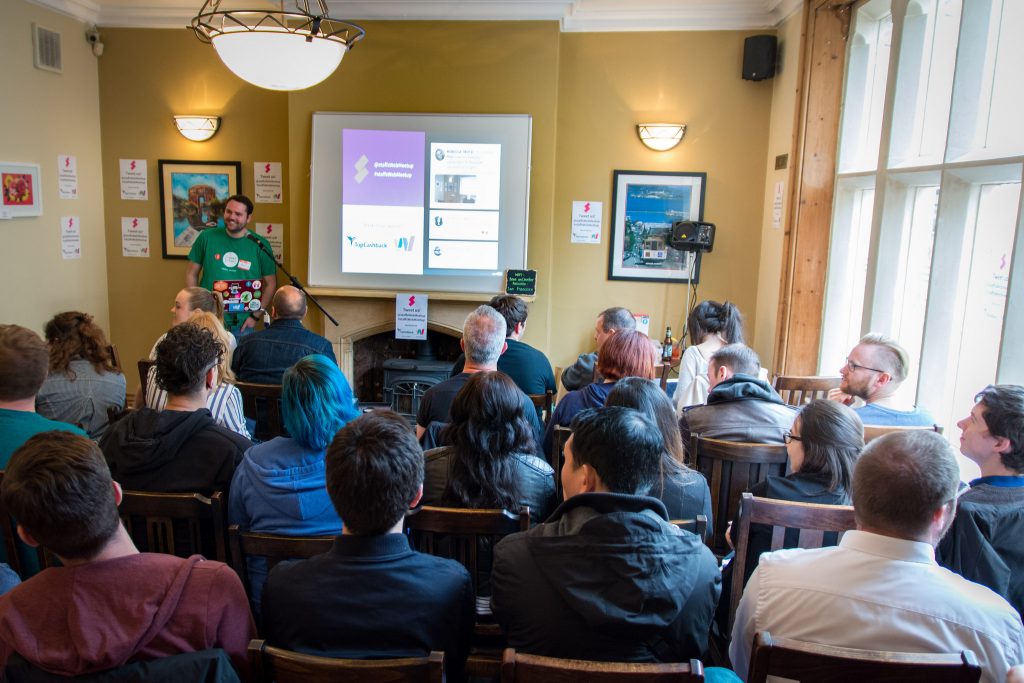
For a long time I have wanted to write a posts sharing how we organise the meetup, the mistakes we’ve made and advice for anyone who wants to set their own up.
So without further ado, here are the things I’ve learned from organising a meetup.
Do it for the right reasons
Running a meetup is time consuming so make sure you’re doing it for the right reasons. My personal goals for the meetup were:
- Connect with people in the local area.
- Learn what others are up to in the industry.
- Make some friends.
I had no monetary goals – that may happen but definitely shouldn’t be a goal or a reason to run a meetup. To invest this much time into something it has to be about more than money. It has to be a passion.
Find people to help you
Thinking you can run a meetup by yourself is noble but also naive. It requires a huge amount of time to organise and promote each event.
Ask for help. If you don’t know anyone who can help you could ask at your first event. Remember you might not be able to attend all meetups so you need others who can cover you.
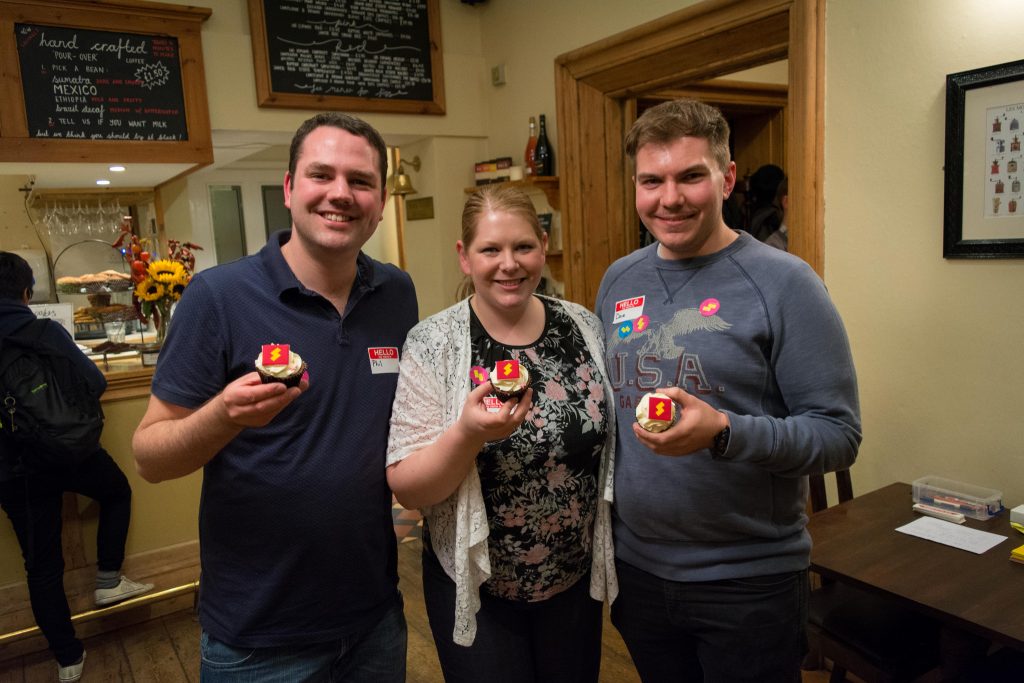
At Staffs Web Meetup we have a core team of three people who work during the month to organise the events. We have another three or four people who regularly help on the evening.
Don’t underestimate the work involved
We spend dozens of hours organising each event. Just to give you an idea of some of the things we do behind the scenes:
- Plan upcoming events
- Find speakers
- Secure and communicate with the venue
- Secure and communicate with sponsors
- Maintain the website
- Maintain the Meetup page
- Edit photographs
- Print promotional material
- Promote the event on Twitter, mailers and in person
Attend other local meetups
It’s likely that everything you’re trying to do has already been accomplished by another organiser. I would recommend visiting other meetups to get ideas and ask questions.
Most meetup organisers are doing it in their free time so are more than willing to offer advice and help. Don’t think of them as competition but as partners. Try building a mutually beneficial partnership where you can promote each others events.
Marketing strategy
Don’t underestimate the amount of promotion you will need to do. Don’t assume people will just turn up as soon as your post on your twitter account. Consider as many different ways of promoting as possible.
Here are some ideas for promoting your first event.
- Visit local business in person to share your ideas.
- Email local businesses, including a follow up to those you visit in person, with information about the meetup.
- Ask your venue to promote the event.
- Attend other meetups and ask the organisers if they can give you a shoutout.
- Use Meetup.com. It has a large community of people who already understand and attend meetups. It also emails members of a new meetup groups in the area.
- Contact any local magazines to see if you can be listed on their events pages.
We still do all the above now, but we also do the following:
- Tweet on the meetup account (@staffsWebMeetup).
- Continue using Meetup.com. It automatically email members when a new event is created, the week before the event and the day before. It’s a massive time saver!
- Create a mailing list and ask people for their email on the evening. A great way of doing this is with feedback forms. We’ve recently dropped feedback forms but were beneficial during the first year.
- Communicate with your mailing list information about the event including speakers, schedule and parking. We do this a one to two weeks before because Meetup.com doesn’t send any emails in this period.
- Distribute promotional packs to business owners and attendees. Our packs include a poster, a few stickers and a couple of drink vouchers to entice new attendees.
Remember to ask new attendees how they found out about you. Tracking this information will indicate which are the successful streams of promotion. Promoting is the most time consuming part of organising a meetup. Be adaptable and prepared to drop things that aren’t working and try new ideas.
Consider what equipment you need
We have a lot of equipment for each meetup – some necessary and others are nice to have. If you’re hosting talks you should consider purchasing, renting or finding a venue that has the following equipment.
- A projector with many ways to connect to it (VGA, mini display, HDMI at the least).
- A computer with Keynote, PowerPoint and access to the internet.
- Stands to put the project and computer on. We use these because they can be adjustable. Don’t rely on the venue to have a random table available.
- A white screen or a white wall.
- A microphone and amplifier. There is nothing more frustrating than having to listen intensely to hear a speaker.
- A couple of long extension cords. Plugs are rarely where you want them.
We also have the following equipment in addition.
- A presentation clicker is useful but not required as long as the computer is in arms length.
- A microphone stand. Holding a presentation clicker and microphone can be awkward.
- A portable white board that we use for community messages and job postings.
- Business cards and stickers for promotion.
If you’re giving away free drinks remember to consider how this will work. We hand out stamped business cards as a coupon for the bar.
Find the right venue
Before searching for a venue ask yourself the following questions.
- What equipment do I have and what equipment does the venue need?
- How many people do I predict will be attending? Be realistic. Ten people in a room of 50 will feel awkward and I don’t think the venue will be pleased.
- Does the venue sell food and drink? You don’t need to supply them for free but people will definitely want the facilities to buy them.
- Is it easily accessible by public transport? You’ll be amazed how far some travel.
- Do you have a budget for your venue?
Based on the answer to these you can narrow down your search for a venue. The best venue is a public place such as a coffee shop or bar with a private area. They are already designed to accommodate groups of people and are in ideal locations. Keep in mind these are businesses so do need to make some money to host the event. You might be able to negotiate a free space in exchange for food and drink sales. We’re lucky to have sponsors who cover the cost of the venue, food and a drink for everyone.
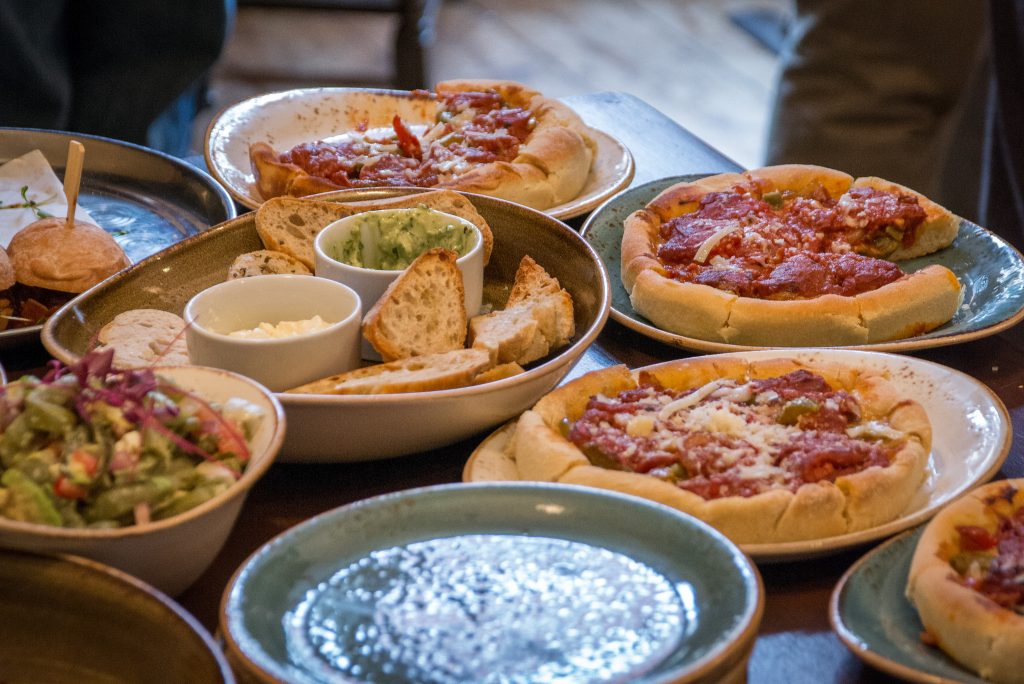
If you can’t find a coffee shop or bar you could consider using a library, university or company office. Remember these places won’t have food and drink available so you might need to stop at a local supermarket. Most people attend straight after work so drinks and snacks should be available.
How often and which day?
Most meetups are either monthly or quarterly. We opted for monthly but I would recommend quarterly to start. We’ve managed to streamline things but the workload can be overwhelming.
When we started the meetup we tried to find the best day for most people to attend but this is nearly impossible. Someone will always be unable on a certain day. In the first few months we moved the event between Tuesday and Thursday. It made no difference to the number that attended.
Choosing a day is one thing you should be selfish about. As long as the venue can accommodate you, choose an evening that best suits you. You’re the one that has to be there early and leave late so make sure you can make that day on a regular basis.
Securing sponsorship
Don’t expect people to sponsor your event, especially straight away. You’ll need to look after every penny. Try and negotiate for a free venue, keeping in mind the equipment you need.
Sponsorship is helpful for covering the running costs of a meetup but you can manage on a low budget (maybe £30-50 a month). Offering food and drink to attendees is nice and makes the evening feel special but not required. As long as you have access to the right equipment and a free venue, you’re half way there.
We’ve been very lucky at Staffs Web Meetup that companies have been open to sponsoring. This advice is coming from a privileged position but choose your sponsors carefully. We wanted our meetup to be a relaxed environment where people can learn, network and make friends. We agreed to stay clear of any sponsors who just want to promote or poach people from other businesses. This is a community event and we wanted sponsors who would support that.
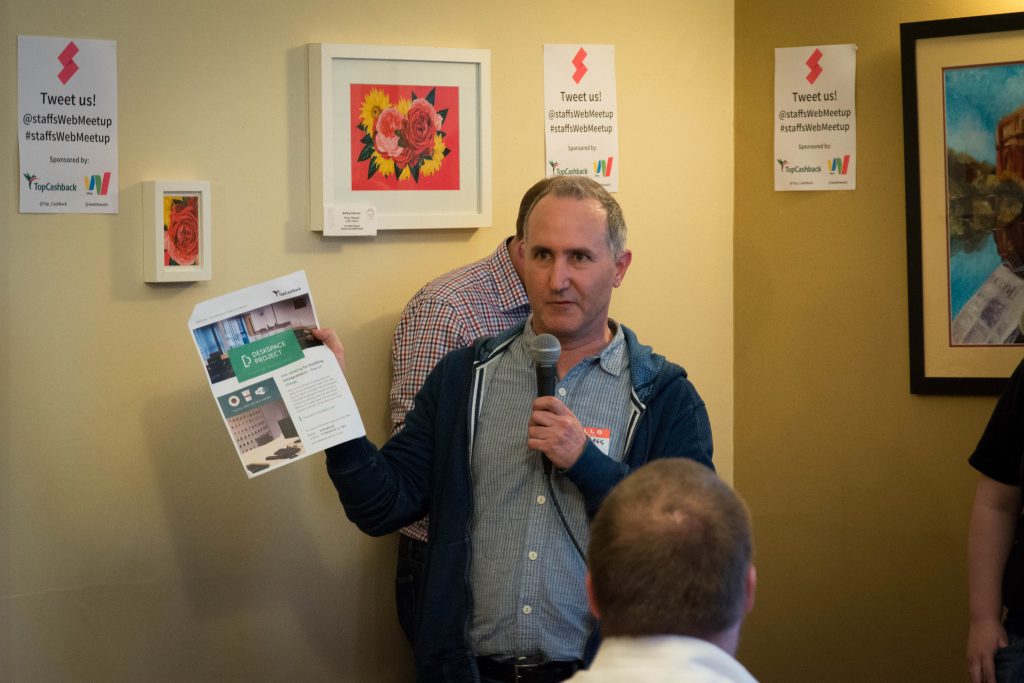
Once you have a few events under your belt you are in a much better position to pursue sponsors. Start asking at your events to see if there are any business owners who are able to help with running costs. If you can’t find anyone at your meetup, consider looking at who sponsors other meetups. If they’ve already sponsored one meetup they might be willing to sponsor yours.
If you do find one, try to secure ongoing sponsorship. Finding sponsors is hard and stressful so having them on board long term will help sustain the meetup.
Don’t put too much content into an evening
When we first started we decided to have four lightning talks at each event. We used the format of two talks, a break and two further talks. While the content of the evenings was great it was just too much.
We discovered that it was a very busy night and with most attending came straight after work. After a busy day people want to attend a relaxed even where they have the opportunity to socialise. On top of this, finding four talks each month is a big task.
We have now settled with two lightning talks, a long break followed by an open discussion. The open discussion session was inspired by WordPress Birmingham and is a twist on lean coffee. The open discussion session is incredibly popular.
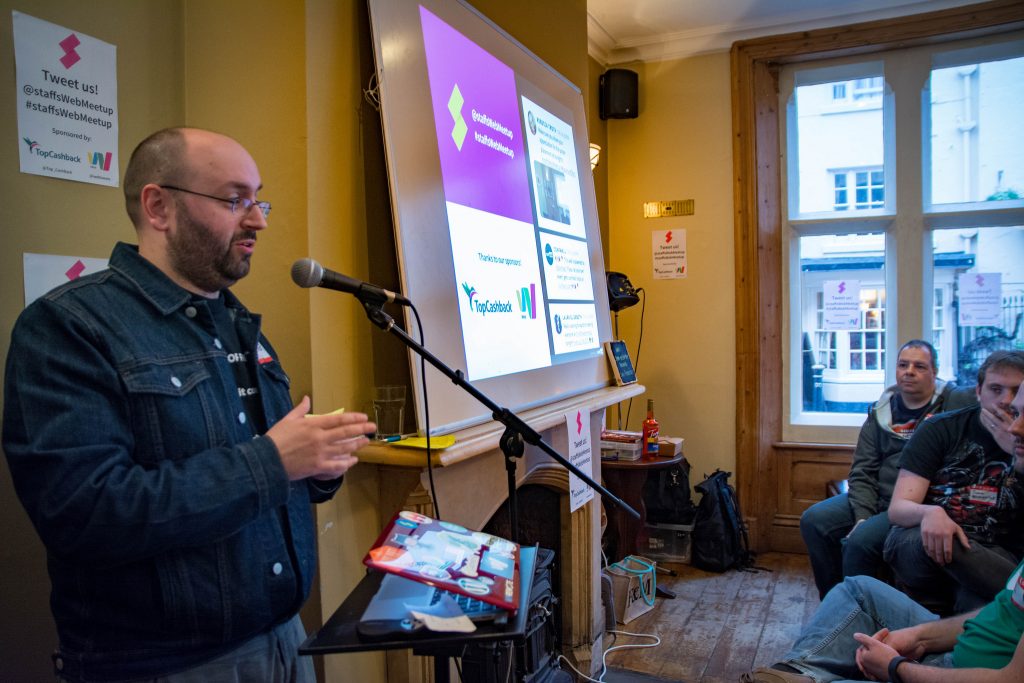
While this is our default format we do mix it about. Some months we will have one longer talk, others we won’t have an open discussion and a couple times a year we try to host a workshop.
More recently we have been tailoring the evenings to a certain theme which has worked well. The web industry is broad and offering an evening dedicated to a certain topic encourages people from that discipline to attend. Examples include design, WordPress, SEO, testing and business development to name a few.
Plan ahead
It’s important to plan more than one event ahead. We generally have a plan for the next six months. It’s hard to write and organise talks so having them booked in advance helps us and the speakers to prepare. We try to mix the theme of evenings so we don’t have two consecutive months on a similar topic.
A tip for planning is to visit other local meetups. Chances are they will host speakers who can also talk at your event. It’s hard and time consuming to write a talk so finding people who already have one makes it more likely they’ll say yes.
We don’t offer any money for speaking at our event. We have sponsorship but not enough to pay speakers. Even though you’re not paying them you might wish cover their travel expenses or give them some free drinks. It’s the least you can do for the effort that goes into a talk and makes it more like they’ll speak again in the future.
Communicate with speakers, venue, sponsors and attendees
Constant communication with speakers, venue, sponsors and attendees is key. For the event to be a success everyone needs to be in the loop and updated on any changes.
Here is a short list of things you need to tell people about.
Speakers
- Where the venue is.
- Do they need any help getting to the venue.
- What time they are speaking.
- How long it takes to get to the venue.
- Any local information they need to know such as traffic hotspots.
- Where they can park if they’re driving.
- How long is their allocated speaking slot, or how long do they need.
- Whether you will open the floor to questions or not.
- The equipment you already have and if they need anything specific.
- The stability of the internet connection at the venue in case they are relying on it for their presentation.
- A brief introduction about them for both the website and the host on the evening.
- Do they need any help getting home. Make sure everyone they’re aware of when the last train is.
Venue
- Confirm the date.
- Confirm the predicted numbers that are attending.
- What time the event will start and finish.
- Let the venue know if any attendees have certain accessibility or dietary requirements.
- Equipment you need from them.
Sponsors
- Make sure they are happy with how you are promoting them.
- Do they have anything specific to promote this month.
- How they are paying? Is it directly to the venue or to a bank account.
Attendees
- Let them know the running order for the evening.
- Tell them about any changes to schedule.
- Let them know the easiest ways to get to the venue and where there is free or affordable parking.
- Check if any attendees have certain accessibility or dietary requirements.
Always greet people at the door
This is one of the most important things. On the evening you should stand by the door to welcome people to the event. Remember it’s a scary thing to go to a meetup, especially on your own. Having someone there to say hello when you turn up helps put people at ease.
At Staffs Web Meetup we welcome people to the event. While we’re chatting to them we get them to write a name tag and hand them a drink voucher. Name tags encourage people to talk and removes the stress of remembering names. If they’re new to the meetup we let them know about the free food and drink available and a rough running order. I like to try and point out a few people who work in a similar field so they have someone to strike a good conversation with.
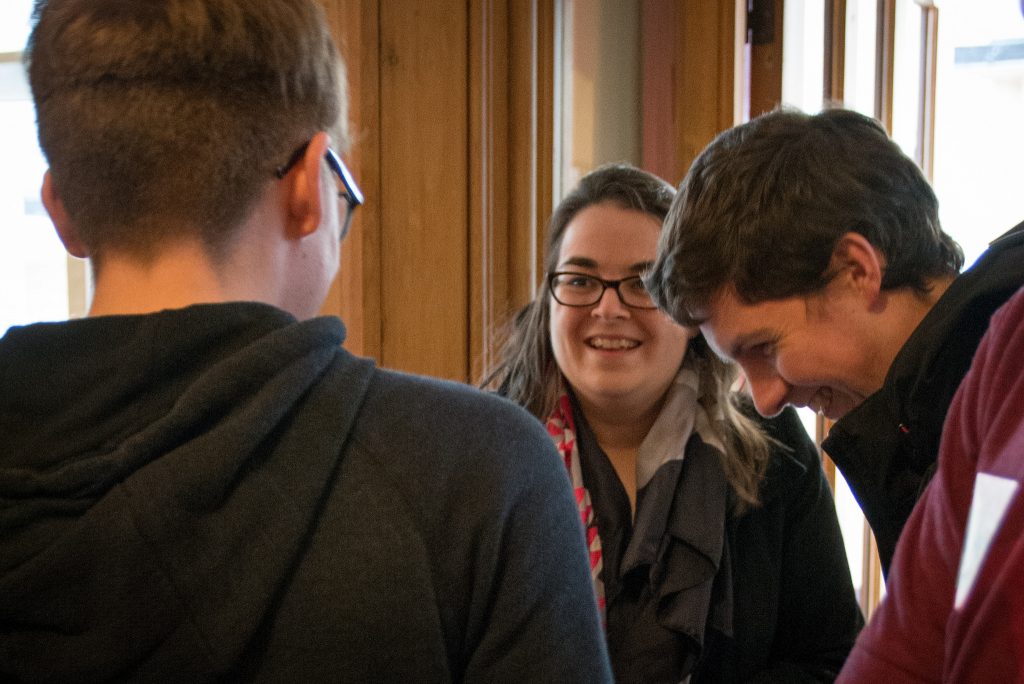
It doesn’t sound like much but this has been praised dozens of times by attendees to our meetup. All too often people walk into meetups not being welcomed, not sure if they’re in the right place or what they have to do.
Be available on the evening
Do as much work as you can beforehand to make sure you are free during the evening. If you see someone who is alone, go and have a chat with them. For new people it’s likely they don’t know anyone so your face will be the only one they recognise.
Have fun!
It’s a lot of work but it’s also a lot of fun. Meeting new people, learning new things and becoming friends is rewarding.
If you have any questions about organising a meetup or want to know any intricate details feel free to tweet or email me. If you fancy meeting in person you can see when the next Staffs Web Meetup event is on our website.
